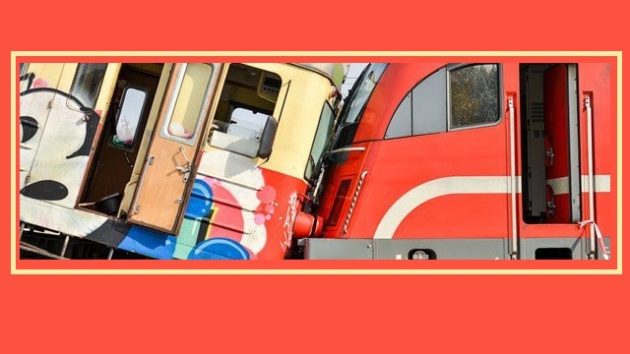Government Transportation is Literally a Train Wreck by Jairaj Devadiga
In March of 2015, Germanwings Flight 9525 crashed into a mountain, killing all 150 people on board. On November 20 of this year, the Indore-Patna Express derailed after a suspected rail fracture, killing at least 149 people. Both events were tragic and probably preventable, but the responses to these tragedies couldn’t be more different.
Germanwings Flight 9525
This was the first and only fatal accident in the 18 years of the airline’s operations. The co-pilot locked himself in the cockpit and deliberately flew the plane into the mountain because he was depressed and wanted to commit suicide. His doctor had deemed him “unfit to fly’, but he had hidden this information from the airline.
Lufthansa, which owns Germanwings, offered an initial sum of 50000 Euros (₹36.25 lakh) to the families of the victims to help cover immediate costs. For families of German victims, the amount was 95000 Euros (₹68.89 lakh). This was separate from the compensation, which amounted to $206 million in total, or ₹1.4 crore per family. Many families are not satisfied with this compensation offer, and have filed lawsuits, so Lufthansa may actually end up paying substantially more.
In the aftermath of this incident, Lufthansa and other airlines introduced more stringent background checks. They put in place several safety measures, such as requiring two crew members in the cockpit at all times. They did their best to make sure that such a tragedy is never repeated.
This phenomenon isn’t unique to Germanwings and Lufthansa. Indonesia AirAsia Flight 8501 crashed in 2014 due to a malfunction, which the pilot was unable to handle. As with Germanwings, this was the only fatal accident in the airline’s history. The airline similarly offered an initial compensation of ₹16.42 lakh for immediate expenses, on top of the ₹68 lakh it offered to each of the victims families. As with Lufthansa, they might end up paying more once all the lawsuits are settled.
Following the accident, the airline implemented improved training programmes for its pilots so they can respond more effectively in the future and avoid such a tragedy.
The Indore-Patna Express Derailing
Unfortunately, the derailing of one of India’s publicly owned railways was not the first time this had happened. Thousands die every year in rail accidents, and far more are seriously injured. In 2014 alone, more than 25000 people were killed in rail accidents.
In response to the accident, politicians offered cliched statements of condolences to the bereaved families. Railway minister Suresh Prabhu promised that the guilty would receive the “strictest possible punishment”. Narendra Modi announced a compensation of a measly ₹2.5 lakh to the families of the deceased.
This has been sequence of events following train accidents for many years, regardless of who was in charge of the government at the time. Few, if any, proper measures have been taken to improve the safety of rail travel.
Accountability in the Marketplace
Why is it, that airlines take steps to make flying safer and provide more generous compensation to those affected while railway officials seem so callously indifferent to the safety of their passengers?
The airline companies and aircraft manufacturers have to pay millions of dollars in compensation to the victims families. When company profits take a hit, the CEO does not get a bonus that year. Those who were responsible for the accident lose their jobs. The shareholders receive smaller dividends, if any dividends at all, that year.
The airlines voluntarily offer compensation over and above the legal requirements to encourage customers to continue to fly with them. They improve pilot training and aircraft design for the same reason.
Markets are savage and unforgiving masters to those who disregard the consumer’s interests. They hold people accountable and provide incentives to make products and services more reliable. That is why flying is so safe and is becoming safer every year.
Government-run railways, on the other hand, have had an abysmal safety record over the years. Why? Because the bureaucrats responsible did not lose their jobs. They continue to receive their pay even if they don’t perform. They will still receive promotions based on seniority regardless of how well they performed their duties.
What about the politicians? When Modi and Suresh Prabhu announce compensation to victims and their families, they are not paying out of their own pockets. Taxpayers, are on the hook for that money. Every time a bureaucrat or politician commits a monumental and expensive blunder, we pay for their mistakes.
The railways won’t go bankrupt, because like every government venture, they will be propped up with taxpayer money. The manufacturers of the trains and tracks will not go bankrupt. They get contracts from the government, based not on quality, but on political connections.
Government employees operate under the same lack of incentives to improve that their political bosses do, so those working in the Indian railway system have little reason to ensure passenger safety.
The solution is obvious. The railways must be privatized, not only to ensure better quality of service but more importantly, to save countless precious human lives.
Jairaj Devadiga
Jairaj Devadiga is an economist who looks at the less obvious, but devastating, effects of government policies. When he is not bashing governments and advocating free markets, he enjoys reading about medicine, computers, astronomy, and law among other things.



Leave a Reply
Want to join the discussion?Feel free to contribute!